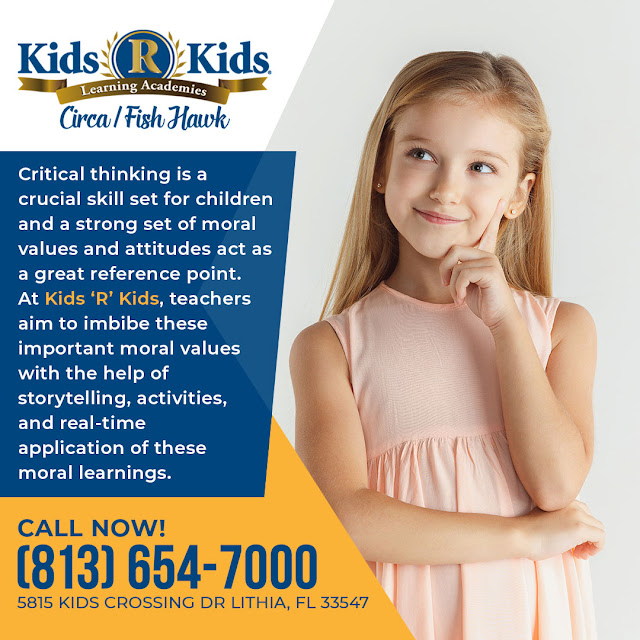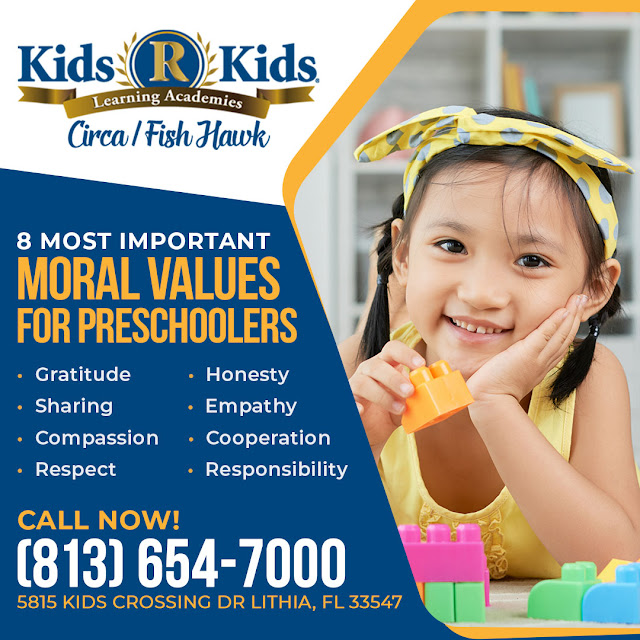We are enrolling! Join us in nurturing young minds, fostering creativity, and creating a brighter future. We're excited to introduce your child to a world of possibilities! Contact us today for details.
8 most important moral values for preschoolers
Moral values shape the attitudes, beliefs, and ideas of children, fostering their development into undeterred and morally strong individuals. Imbibing these values offer direction and character to children as they move through life. Kids ‘R’ Kids, an educational preschool, dives into the 8 most important values that preschoolers can be taught early.

-
Gratitude
A 2019 study published in the Journal of Happiness Studies shows the link between gratitude and happiness in children by age 5. Therefore instilling gratitude in kids at a young age helps them grow up to be happier people. By cultivating the readiness to show appreciation and thankfulness for what they have, children can find contentment. Teach children to never take anyone or anything for granted. By performing acts of kindness and modeling gratitude, caregivers can set an example for children to follow.
-
Honesty
In all successful relationships, personal or professional, reliability and trustworthiness are the foundation. This foundation is built by honesty. Caregivers can nurture the trait of honesty in children by modeling this behavior and explaining its importance. It is important to give children a safe space to be honest where they do not fear negative consequences but are rather met with acceptance and discussion. Small steps such as being honest with teachers, classmates, and parents are a good starting point.
-
Sharing
The adage goes, that sharing is caring. But why is it important for children to learn this skill? Sharing helps children make friends, play cooperatively, negotiate and cope with disappointment. Compromise and fairness are great lessons that come with sharing. By age 3, preschoolers begin to understand turn-taking and sharing. This skill can be built by praising good turn-taking, encouraging fairness, and explaining about sharing.
Certain activities that encourage sharing and taking turns such as choosing dress-ups together or drawing a big picture together using the same packet of crayons can slowly build this muscle.
-
Empathy
Empathy is the ability to put oneself in another person’s position, and see the world from another person’s perspective, especially in terms of emotion. Experts say that empathy is a crucial skill to have for children as it helps build connections, regulate emotion, and promote helping behaviors. In school environments, empathy can prevent bullying, encourage friendships, and allow children to receive help from others. Listening to children’s concerns, issues, and problems, and trying to help them can foster this trait.
-
Compassion
A step-up from empathy, compassion is an important trait that helps children understand how others are feeling and the impact of their actions. It enables them to think creatively in situations and act with kindness, patience, acceptance, and tolerance of the self and others. It builds stronger relationships with other children, promotes social harmony, and lowers the risks of bully-ish behavior.
-
Cooperation
This is an act of extending help to others to attain a goal that is often mutual. Doing household chores together is one example of a collaborative activity that builds the trait of cooperation. The understanding of working as “we” rather than “you” and “I” helps children work together in harmony towards the collective success of a group. This is a crucial skill in professional situations.
-
Respect
Respect comes from the Latin word “respectus” which means attention, regard to consideration. It involves listening and caring about the other person. This value lies at the core of healthy and flourishing relationships. It lays the foundation for good social skills and civil behavior. Young children should be taught to respect every individual irrespective of age, caste, creed, religion, ethnicity, beliefs, and difference of perspective.
-
Responsibility
Responsibility involves making decisions, being trusted, and learning to take credit for one’s actions—whether good or bad. Children need to learn that their decisions affect them and others around them. Therefore, it is important to make choices responsibly. Delegating household chores is one of the best ways to imbibe this value in children.
Critical thinking is a crucial skillset for children and a strong set of moral values and attitudes act as a great reference point. At Kids ‘R’ Kids, teachers aim to imbibe these important moral values with the help of storytelling, activities, and real-time application of these moral learnings.

Why Kids ‘R’ Kids?
The philosophy of “Hug First, Then Teach”, defines every aspect of what Kids ‘R’ Kids, Circa Fishhawk stands for. Unlike many daycare centers or childcare providers, its methodology is a whole-child approach. Striving to strengthen and encourage every child’s emotional, intellectual, social, and physical well-being, Kids ‘R’ Kids leverages the expertise of its childcare providers and its dynamic partnership with parents to offer children holistic learning and growth.
Kids ‘R’ Kids International is accredited by AdvancED®, the world’s largest education community, and the Southern Association of Colleges and Schools Council on Accreditation and School Improvement (SACS/CASI). SACS/CASI is an accreditation division of AdvancED®. This accreditation ensures that the high accreditation standards are met and exceeded.
Call today at (813) 654-7000 to learn more about the Kids ‘R’ Kids before and after school programs (Kindergarten to Grade 5) or to schedule a visit.